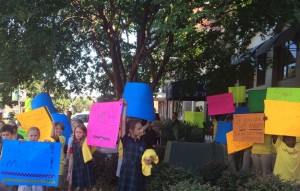
Students protest a lawsuit challenging Florida tax credit scholarships during an August rally in Tallahassee.
Fifteen parents are asking a Florida circuit court to allow them to help defend the country's largest private school choice program against a constitutional challenge.
Between them, the parents have 32 children who attend private schools using Florida's tax credit scholarship program. Many of them also have children in other choice programs - McKay scholarships for special needs students, Personal Learning Scholarship Accounts, or charter schools - which their lawyers contend would also be threatened by the legal arguments in the case.
The parents include a single mother on disability from Gadsden County, a former teachers union organizer, and a doctor's assistant who fled Venezuela after the election of Hugo Chavez. They plan to intervene in the lawsuit to represent some 69,000 low-income students who use the scholarships to attend private schools.
They argue in court papers filed Tuesday that if the lawsuit succeeded and their children were uprooted from their current schools, "They would suffer not merely the financial loss of the scholarships, but also a serious blow to the Low Income Families’ educational hopes for their children."
The lawsuit, filed in late August by the statewide teachers union, the Florida School Boards Association, the NAACP, the statewide PTA and other groups, argues the tax credit scholarship program violates the state constitution by creating a parallel education system backed by public money. They also argue the program violates a prohibition on state money going to religious institutions.
In their motion to intervene, lawyers for the parents say that logic could threaten other educational options, including charter schools and special needs scholarships that also help families pay private school tuition. They point to a separate, far broader lawsuit against the state, which makes arguments challenging those other options.
In their motion, filed in Leon County Circuit Court, their lawyers note participants in the tax credit scholarship are predominantly minorities, by definition low-income, and often among the lowest-scoring students in the public schools they leave behind. Several of the parents note their children used the scholarships to escape academic turmoil or bullying.
"In the absence of the Program, the Low Income Families reasonably fear for the educational future of their children, not to mention their safety," the legal filing states.
The other parties in McCall v. Scott have already agreed to let the parents intervene in the case, but the plaintiffs are questioning whether the parents should have the ability to participate as a full-blown party to the lawsuit.
The parents' lawyers contend their interest in keeping their scholarships is "direct, substantial and immediate, and will not vary over the course of this litigation, whereas the (state) Defendants' interests in this lawsuit are liable to shift with the political winds."
A judge has dismissed a third lawsuit, challenging legislation that expanded tax credit scholarships and created the personal learning scholarship accounts, but the Florida Education Association has until next Tuesday to re-work its legal arguments.